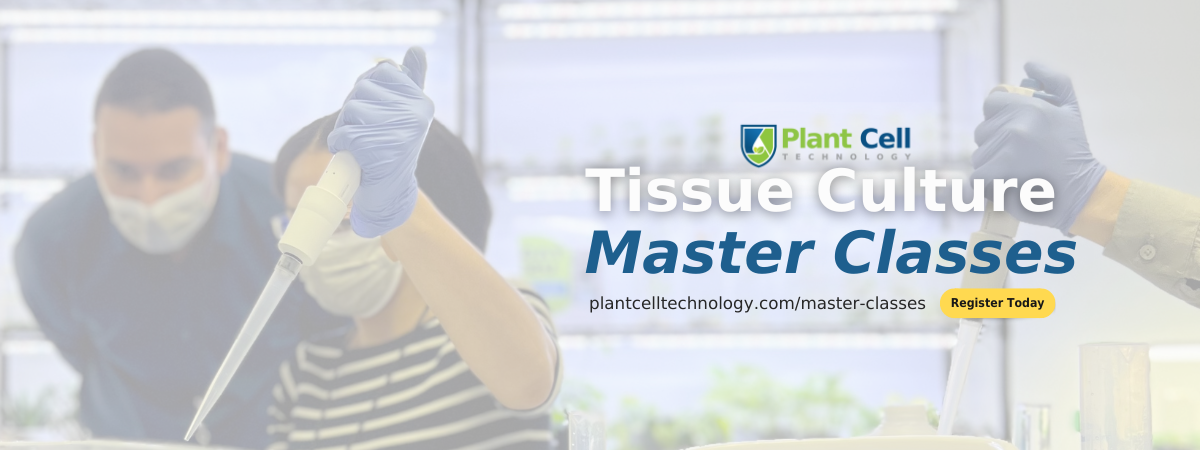
Step-By-Step Guide On How To Get Started In Tissue Culture
As a content and community manager, I leverage my expertise in plant biotechnology, passion for tissue culture, and writing skills to create compelling articles, simplifying intricate scientific concepts, and address your inquiries. As a dedicated science communicator, I strive to spark curiosity and foster a love for science in my audience.


If You Just Discovered What It Is
Introduction
So, you’ve just learned “What is plant tissue culture?” but are not yet sure about getting started in the field.
Your mind must have flooded with hundreds of questions, such as "Where to start? What materials do I need? I know what it is but where can I learn more about it? Can anybody show me how it is practically done?"
We understand you and are here to navigate these challenges with you. That's why we've meticulously crafted this detailed, step-by-step guide. It's designed to arm you with a comprehensive understanding of the tissue culture process, including essential resources, materials, and beginner-friendly tips to confidently embark on this adventure.
However, let's first lay a solid foundation. Before we dive into the intricate chapters of our guide, we'll start with a concise first building block on the tissue culture process, acquainting you with its foundational theories.
Introduction to Tissue Culture— "What is Plant Tissue Culture?"
Plant tissue culture is an advanced technique of plant propagation. It involves introducing a few healthy tissues of plants in an artificial medium in a sterile environment under controlled physical conditions. The process can be better understood by dividing it into four different stages:
- Initiation stage: At this stage, the explant (or the plant part you take to grow the plant, such as leaves, stem, or seed) is taken from a healthy plant, surface sterilized to get rid of dirt or any other microbe stuck on the surface of the tissues, and then the surface sterilized explant is transferred to a nutrient media without hormones for their growth.
- Multiplication stage: At this stage, the explant grown at the initiation stage is divided and transferred to a fresh hormone-containing media. The suitable ratio of cytokinin to auxin (at this stage the amount of cytokinin used is more than the auxin) is used for the shoot formation.

- Rooting stage: The obtained shoots at the multiplication stage are transferred to a rooting media containing a higher amount of auxin than cytokinin (the ratio of auxin to cytokinin differs for each plant species. The auxins stimulate root formation in the plants.
- Acclimation stage: The plantlets obtained in the tissue culture environment can not be directly transferred to the natural environment. Why? The answer is obvious they have been grown in a controlled environment free of microbes and any other pathogen. Thus, they aren’t ready to adjust to the abruptly fluctuating natural environment and fight against hundreds of microbes that are ready to attack them when they are grown outside. Thus, the plantlets are first transferred to the greenhouse for their proper growth and development and prepare them for the natural conditions. Slowly, adjusting to the greenhouse conditions, the plantlets are when ready to grow in natural conditions.
The process may sound meticulous, but it’s worth it when in a small space you will be able to grow hundreds and thousands of plants. And, that’s not it, tissue culture has many other advantages to offer, such as:
- Production of disease-free plants.
- Production of plants at a commercial scale in a small space compared to what’s required while using conventional approaches.
- Production of haploid plants.
- Production of plants irrespective of their seasons.
- Conservation of endangered plant species.
And, there are many other that you can learn here.
What’s Your Next Step After You Learn What Tissue Culture Is?
After learning the theory of tissue culture, the next thing you need to do is to answer the following questions for yourself:
- Which plant do you want to grow?
- Do you want to tissue culture for commercial or personal use (as a hobby)?
- How much can you invest in the process?
- Do you want to build a professional lab or a home-based lab?
Answering the above questions helps you get clarity on what you want to achieve with the technique and move in the right direction
If looking to do a business using the technique, better to talk to an expert or take a class to get a hang of the technique. Even if you're pursuing it as a hobby, enrolling in a class can greatly assist in getting started with the technique.
If you want to get started in the technique by yourself, here are some steps to follow:
- After deciding which plant species you want to grow, gather the available resources having the procedure of tissue culture of your desired plants.
- In the paper, go to the methods and materials section and see what they have used in the process.
- Make a list of all the materials you need.
Note: The papers will only contain information on how to grow the respective plants and chemicals and equipment used. There will not be any information on the lab building.
- If you don’t have any tissue culture setup, choose one area where you want to do the tissue culture. Make sure it’s meticulously cleaned. Assign zones/areas for preparations, culture, and acclimation of plants. (Below we have given some references to articles having information on lab building and the materials you need)
- Purchase equipment, materials, and chemicals and organize in your lab. Ensure that a complete aseptic environment is maintained in the culture room where you place your laminar hood or transfer explants in the media. Also, keep your room organized to prevent any confusion in the process.
- After you have your lab setup and materials, you can start experimenting with your desired plants. If you are confused about any stage of the process or having a hard time getting any success with your plants, refer to the following videos and blogs that we have curated for you to help you in the process.

Basic Materials To Get Started— Regardless Of Lab Size
If you are a beginner and have just set your foot into tissue culture, it’s time I help you learn the ins and outs of the technique. I have curated a series of articles to help you understand the theory of the technique, the material you need to get started, and setting up a lab at an effective cost.
What’s one major obstacle that you face while wanting to start tissue culture? “Which plant will be easy to grow in tissue culture?” I read your mind, right? In the article “The Top 10 Easiest Plants To Tissue Culture For Beginners” I provide you with a list of ten plants that you will find easy to tissue culture.
Oh, one pro tip: never choose hard woody plants if you don't want to be frustrated at the first stage of the process. The woody plants are hard to grow and you will need some experience to start working with these plants. Some plants that you can easily get started with are Monstera deliciosa, African Violet (Saintpaulia ionantha), and Philodendrons. Find the rest of the plants in this article.
Now, you know what plant to work with, but, what materials do you need to get started? Refer to these articles, which will help you get a grasp on the requirements of tissue culture and building a lab for yourself in your house:
- Plant Tissue Culture Essentials: PCT's Comprehensive Equipment Guide
- How to Start Tissue Culturing at Home for Under $300: A Budget-Friendly Guide
- How to Build Your Own Tissue Culture Lab!
- Why Is It Necessary For Plant Tissue Cultures To Be Sterile?
- Elevate Your Culture: 7 Essential Tissue Culture Tools
- Turn Tissue Culture into a Profitable Venture!
If there are any questions you have regarding the process or blog, feel free to write to me at anjali@plantcelltechnology.com or info@plantcelltechnology.com.

Videos To Help Tissue Culture Beginners
Well, tissue culture is a practical technique. After learning the theory you must try and implement the technique to learn it practically; learn about its setbacks when practicing in real life; and see how the theory of the technique turns out in the lab. Because talking about the technique is easier than doing it.
But, if you are confused about how to get started and it would have been great if you could watch someone doing it and learn from their process, then our YouTube channel is just for you.
Our lab director, Francisco Palacio, has curated many videos on the subject to help you with all the four stages of the technique. From making solutions and media for the process to acclimation of plants, you can learn almost everything in our videos.
If you’ve just discovered what tissue culture is, then below are some recommended videos that you must watch to get started in the field:
- What is Plant Tissue Culture? Explained in 3 Minutes!
- How to Make Plant Tissue Culture Media for Beginners: Step-by-Step Tutorial
- Some Aseptic Techniques You Can Use In Your Tissue Culture Process
- How To Use A Bunsen Burner In Your Tissue Culture Process
- How To Make Stock Solutions For Plant Growth Regulators
- Making Tissue Culture Media In The Microwave
- Speed Up Your Tissue Culture Media Preparation: Tips from Our Lab Director Francisco
- How To Use Plant Growth Regulators For Plant Tissue Culture?
You can prefer this “Tissue Culture 101: Beginner's Guide” to get a series of videos that will help you in the process.

What Books To Read?
If you want in-depth knowledge about tissue culture and are in the mood to get full sciency by understanding the science of cell division and plant growth in controlled environments, books are what you need. There are also some practical tissue culture books that offer you general protocol for many plant species.
But, in the sea of knowledge, where can you find those books that can help you to better understand the topic? Then, here’s an article, I have curated for you, listing five tissue culture books that will help you in your tissue culture career.
How Can Plant Cell Technology Support Your Tissue Culture Journey?
At Plant Cell Technology, we're dedicated to simplifying your tissue culture journey.
Our one-stop shop caters to all your needs, offering a comprehensive array of tissue culture chemicals, equipment, and our flagship product, PPM™, ensuring your cultures remain contamination-free. Beyond products, we offer expert consultations to tackle any challenges you might encounter, providing tailored solutions and direct access to tissue culture experts.
If you are a beginner navigating your way through tissue culture, our comprehensive master classes serve as an excellent resource to educate yourself in the field and kickstart your journey. Our experts cover everything in the class, from basic principles to advanced procedures. Moreover, you get hands-on practice with our instructors to learn the exact execution of experiments and understand the dos and don'ts during the process.
Plant Cell Technology is your one-stop shop for all your tissue culture needs. So, don't wait any longer; explore our products and services here, and feel free to reach out to us at info@plantcelltechnology.com for any queries or concerns.
Blog Categories
View by Level
Popular Blogs

DKW Media: Definition, Use, and Applications
Introduction In vitro plants need nutrients to grow in a lab environment. These media are composed of micronutrients and macronutrients...
Read More
Callus Culture: Definition and Applications
Introduction Tissue culture is not just one technique! Yes, you heard right! As you know, tissue culture is an advanced...
Read MoreSubscribe to Our Newsletter









Join the conversation
Your email address will not be published. Required fields are marked